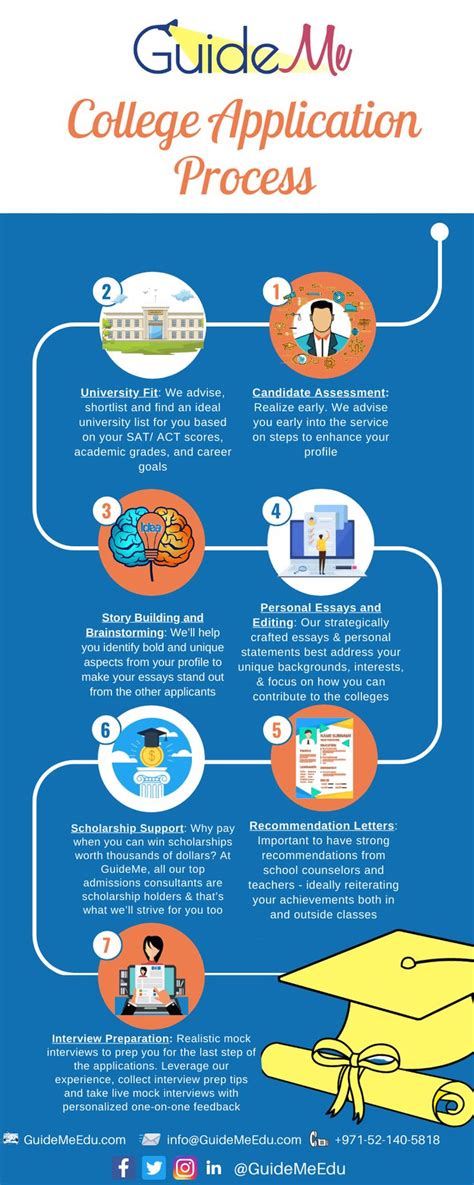The college application process can be a daunting and overwhelming experience for many high school students and their families. With so many factors to consider, from academic requirements to personal statements, it's easy to get lost in the process. However, with the right guidance and support, navigating the college app process can be a manageable and even empowering experience.
In this comprehensive guide, we'll walk you through the ins and outs of the college application process, providing you with expert advice and actionable tips to help you succeed.
Understanding the College Application Process
The college application process typically begins in the spring of a student's junior year of high school and can last until the following spring. During this time, students will need to research and identify potential colleges, meet with counselors and advisors, and submit applications to their chosen schools.
Key Components of the College Application
While the specific requirements may vary from college to college, there are several key components that are typically included in the application process:
- Transcripts and Academic Records: Official transcripts and academic records are a crucial part of the college application process. These documents provide a detailed account of a student's academic history, including grades, courses taken, and standardized test scores.
- Standardized Test Scores: Most colleges and universities require applicants to submit standardized test scores, such as the SAT or ACT. These scores provide a way for colleges to compare applicants from different high schools and backgrounds.
- Personal Statement or Essay: The personal statement or essay is a critical component of the college application. This is an opportunity for students to tell their story, showcase their personality, and demonstrate their writing skills.
- Letters of Recommendation: Many colleges require applicants to submit letters of recommendation from teachers, counselors, or other mentors. These letters provide valuable insight into a student's character, work ethic, and academic abilities.
- Extracurricular Activities and Volunteer Work: Colleges want to see that applicants are well-rounded and engaged in their communities. Extracurricular activities and volunteer work can demonstrate a student's passions, leadership skills, and commitment to social responsibility.

Navigating the College App Process: A Step-by-Step Guide
While the college application process can be complex and time-consuming, breaking it down into smaller steps can make it more manageable. Here's a step-by-step guide to help you navigate the process:
Step 1: Research and Identify Potential Colleges
- Start by researching colleges and universities that align with your academic, career, and personal goals.
- Consider factors such as location, size, academic programs, and campus culture.
- Create a list of 3-5 "reach" schools, 2-3 "match" schools, and 1-2 "safety" schools.
Step 2: Meet with Counselors and Advisors
- Schedule meetings with your school counselor or academic advisor to discuss your college plans.
- Seek guidance on the application process, including deadlines, requirements, and strategies for success.
- Ask for feedback on your personal statement or essay.
Step 3: Prepare and Submit Applications
- Create a timeline for submitting applications, including deadlines and requirements.
- Prepare and submit applications, including transcripts, test scores, and letters of recommendation.
- Proofread and edit your personal statement or essay carefully.
Step 4: Apply for Financial Aid and Scholarships
- Research and apply for financial aid, including grants, loans, and work-study programs.
- Explore scholarship opportunities, including merit-based and need-based awards.
- Complete the FAFSA (Free Application for Federal Student Aid) to determine your eligibility for federal financial aid.

Common Mistakes to Avoid in the College App Process
While the college application process can be challenging, there are several common mistakes that can be avoided with careful planning and attention to detail. Here are some common mistakes to avoid:
- Missing deadlines: Make sure to submit applications well before deadlines to avoid last-minute stress and anxiety.
- Insufficient preparation: Take the time to prepare and practice for standardized tests, and seek feedback on your personal statement or essay.
- Inaccurate or incomplete information: Double-check your applications for accuracy and completeness, including transcripts, test scores, and letters of recommendation.
- Lack of follow-up: Follow up with colleges and universities to confirm receipt of your application and to ask about the status of your application.
Conclusion
Navigating the college app process can be a complex and time-consuming experience, but with the right guidance and support, it can also be a manageable and empowering experience. By understanding the key components of the college application, following a step-by-step guide, and avoiding common mistakes, you can increase your chances of success and achieve your academic and career goals.
Gallery of College Application Process






FAQs
What is the most important part of the college application process?
+The most important part of the college application process is the personal statement or essay. This is an opportunity for students to tell their story, showcase their personality, and demonstrate their writing skills.
How do I choose the right college for me?
+Choosing the right college involves researching and identifying schools that align with your academic, career, and personal goals. Consider factors such as location, size, academic programs, and campus culture.
What are the most common mistakes to avoid in the college app process?
+The most common mistakes to avoid in the college app process include missing deadlines, insufficient preparation, inaccurate or incomplete information, and lack of follow-up.
